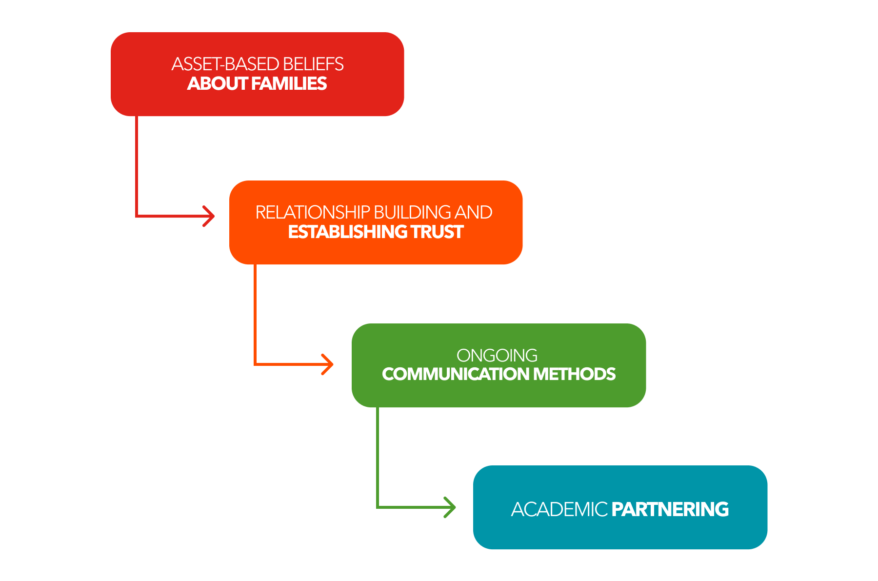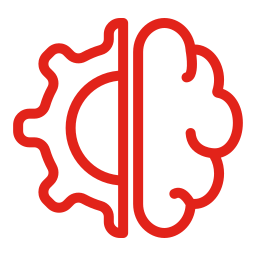The Family Engagement Assessment Tool measures educators’ practice across four domains: Asset-Based Beliefs about Families, Relationship Building and Establishing Trust, Ongoing Communication Methods, and Academic Partnering.
 These domains build upon each other. For example, educators cannot build trusting relationships with families without holding asset-based beliefs. In fact, we believe that asset-based beliefs are the cornerstone of all family engagement work.
These domains build upon each other. For example, educators cannot build trusting relationships with families without holding asset-based beliefs. In fact, we believe that asset-based beliefs are the cornerstone of all family engagement work.
Similarly, without building relationships with families and laying the groundwork for getting in touch with them, educators can’t effectively communicate with them.
Ongoing, open communication leads to supporting students to do their best in school, which is our fourth domain, academic partnering!
Asset-Based Beliefs about Families
 Grounded in strengths-based beliefs of families and students, asset-based beliefs are a mindset that believes all components of an individual’s identity and culture add value inside and outside of the classroom.
Grounded in strengths-based beliefs of families and students, asset-based beliefs are a mindset that believes all components of an individual’s identity and culture add value inside and outside of the classroom.
Asset-based beliefs focus on students’ and families’ strengths, rather than what educators perceive they lack or think they should improve. Asset-based beliefs are the foundation upon which everything else rests.
Consider the difference between the two statements below. Which statement embodies asset-based beliefs about families?
- EDUCATOR: More than half of my students’ families didn’t attend the parent-teacher conference last Tuesday. They don’t care about their children’s education.
- EDUCATOR: More than half of my students’ families didn’t attend the parent-teacher conference last Tuesday. I wonder why… I know they care about their children’s education, and I want to make sure they can show up. I’ll reach out and ask what we can change so they can attend meetings.
Relationship Building and Establishing Trust
 Grounded in trust and shared power, relationships are built not on academics but on deep understanding.
Grounded in trust and shared power, relationships are built not on academics but on deep understanding.
Whether students are entering school for the first time, transitioning to a new grade, or heading out for spring break, trusting relationships between educators and families are the foundation for a successful school year.
Activities like home visits, welcome calls, and events like Back to School Nights are great ways to get to know students’ families. And while it’s often a focus at the beginning of the year, educators should continue to build strong relationships throughout the school year. These strong relationships help ensure students have what they need to succeed.
Consider the difference between the two statements below. Which message would you want to receive the summer before your child starts 3rd grade?
- EDUCATOR: I’m so glad your child is in my class this year. Please read the attached forms and sign them as soon as you can. See you in August!
- EDUCATOR: I’m so glad Ariana is in my class this year! I heard great things about her from her 2nd grade teacher, Mrs. Henn. I want to start the year by asking—what are your hopes and dreams for Ariana this year? I’ve attached some information about what we’ll be doing as a class. Please let me know if you have any questions. See you in August!
Ongoing Communication Methods
 Ongoing communication—especially when there are 5 positive communications for every negative communication—sustains strong relationships and builds trust.
Ongoing communication—especially when there are 5 positive communications for every negative communication—sustains strong relationships and builds trust.
Regular, clear communication sustains a trusting relationship. It ensures that there are no surprises when it comes time to talk about academics and students’ socio-emotional growth. It’s what turns a strong connection into a partnership where families and educators collaborate for student success. Communication can happen over text, email, a phone call, Remind, Class Dojo, or something else! Educators should make sure they’re using the family’s preferred method of communication.
Consider the difference between the two scenarios below. In the first, a parent is reaching out to a teacher. In the second, an educator is reaching out to a parent proactively. Which one helps foster greater trust?
- PARENT REACHING OUT AFTER SCHOOL: Aaravh said he had a tough day at school. Can you tell me what happened?
- EDUCATOR REACHING OUT PROACTIVELY: Hi, I wanted to let you know Aaravh had a tough morning after his bus was late. We talked, and he was worried about missing the field trip. He is feeling better now. Just wanted to give you a heads-up! Please let me know if I can do anything in the meantime.
Academic Partnering
 Grounded in shared ownership of student learning, academic partnering covers academic and social-emotional content, allowing families to engage in their child’s education and get the resources needed to help their child succeed.
Grounded in shared ownership of student learning, academic partnering covers academic and social-emotional content, allowing families to engage in their child’s education and get the resources needed to help their child succeed.
Academic partnering can look like a parent-teacher conference, a student-led conference, an Academic Parent Teacher Team (APTT) meeting, or even a quick chat about academics. Whatever form it takes, it strengthens student learning inside and outside the classroom.
Consider the difference between these two messages to a parent. Which one sets a parent up to support their child’s learning?
- EDUCATOR: Carter is a Level H in reading per his most recent STAR assessment. I advise reading with him to bring up his scores.
- EDUCATOR: Carter scored slightly below average in reading per the most recent testing period. Keep in mind that assessments are snapshots of a moment in time.
You mentioned that Carter is great at learning through real-world examples. One fun way to help him practice is to have him read to you when you’re running errands. For instance, he could read “apple” to you at the grocery store.
Please let me know what advice you have for me as his teacher to support his learning in the classroom. If you have any questions, I am here to help!
The Family Engagement Assessment Tool will give you a more detailed look at what parts of these domains you’re already strong in and share actionable tips for where and how to improve. Take it today at www.engageyourfams.org!